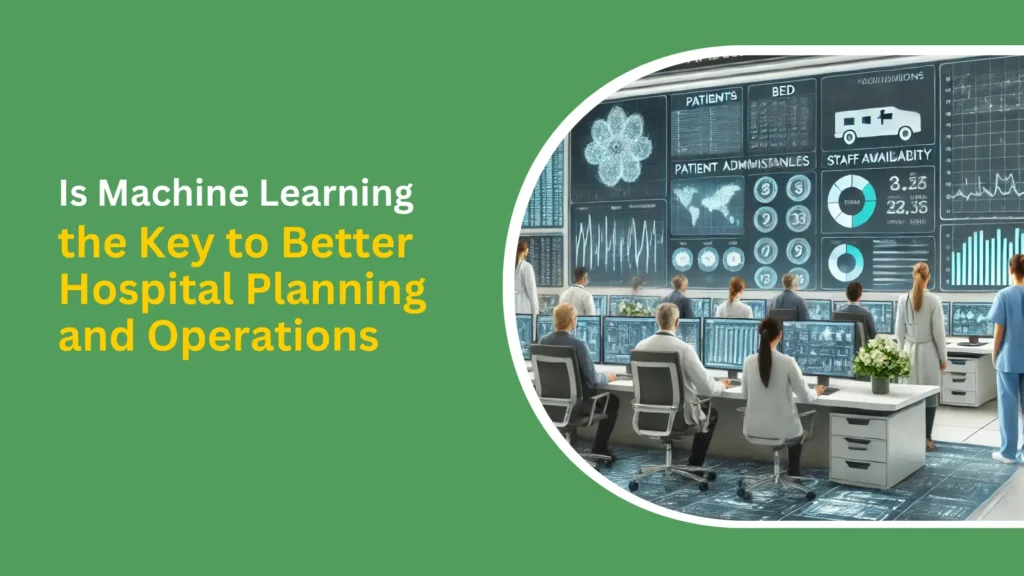The COVID-19 pandemic brought unprecedented challenges to global healthcare systems, forcing them to innovate and adapt rapidly to meet patient care demands while optimizing hospital resources. Among the many technological advancements, Machine Learning (ML) has emerged as a game-changer in hospital planning and operations. This type of artificial intelligence uses large amounts of data to make predictions, automate tasks, and support important decisions.
Machine learning (ML) played a key role during the pandemic. It helps forecast patient admissions, improve resource allocation, and enhance personalized care. Real-time insights help healthcare facilities take proactive approaches, streamline workflows, and focus on patient care. Machine learning has successfully addressed the challenges of the pandemic and has built a foundation for a more efficient and flexible healthcare system.
The Role of Machine Learning in Hospital Operations
Machine learning offers great chances to improve how hospitals plan and operate. Its impact has changed many important areas for the better.
Enhanced Predictive Analytics
ML algorithms can analyze large datasets to predict patient inflow, identify potential hotspots for disease outbreaks, and assess the likelihood of severe health outcomes in individuals. These insights help hospitals effectively use their staff and resources, especially during pandemics or healthcare crises. For example, machine learning models can predict patient surges so hospitals can prepare for ICU capacity, ventilator needs, and other critical resources.
Resource Allocation and Management
Effective resource management is essential for preventing system overload, especially during emergencies. ML enables real-time tracking and prediction of resource requirements, such as staffing, bed availability, and medical supplies. For example, predictive models can forecast ICU bed shortages weeks in advance, allowing hospitals to mobilize resources and adapt strategies accordingly. Being prepared can save lives and make it easier for healthcare workers.
Improving Patient Outcomes with Personalized Care
Personalized medicine is another area where ML shines. By processing extensive datasets, including patient histories and current clinical information, ML algorithms generate insights to tailor individualized care plans. This approach improves patient outcomes, minimizes risks, and delivers efficient care. Personalized ML-powered care becomes particularly significant during pandemics when resources are constrained, and precision is critical.
Virtual Care and Remote Monitoring
The pandemic has increased the use of virtual care. Remote monitoring tools using machine learning (ML) have been key in this change. These tools track patient data in real time. They can find early signs of problems and quickly notify healthcare providers. This reduces the need for in-person hospital visits, minimizes the risk of infection, and ensures timely intervention for patients receiving care at home.
Epidemiological Modeling and Contact Tracing
Machine learning helps healthcare systems understand how diseases spread, predict future outbreaks, and evaluate how well public health measures work. This approach is essential for effective epidemiological modeling. Contact tracing applications powered by ML have also been critical in identifying exposure chains, enabling faster containment of infectious diseases like COVID-19.
The Impact and Advantages of Machine Learning in Healthcare
Implementing Machine Learning in healthcare during the pandemic has brought several benefits:
- Proactive Planning: ML enables hospitals to shift from reactive crisis management to proactive planning, anticipating needs before they arise.
- Better Efficiency: Automation and predictive analytics reduce paperwork and improve how resources are used. This enables healthcare professionals to concentrate more on providing care for patients.
- Flexibility and Growth: Machine learning models can easily scale up and adapt to different situations, from local disease outbreaks to global health emergencies. This makes them a useful tool for healthcare systems.
- Improved Patient Experience: ML enhances the overall patient experience by personalizing care and reducing inefficiencies, ensuring timely and effective treatment
Challenges to ML Adoption in Healthcare
Despite its potential, the adoption of Machine Learning in healthcare is not without obstacles:
- Data Privacy and Security: Handling sensitive patient information creates important concerns about privacy and protecting data. Strong measures are needed to prevent breaches and maintain public trust.
- Data Quality and Availability: ML models rely on high-quality data for accurate predictions. Inconsistent, incomplete, or biased data can compromise model performance and decision-making.
- Integration with Existing Systems: Integrating ML solutions into legacy healthcare infrastructures requires significant time, financial resources, and technical expertise.
Conclusion
The COVID-19 pandemic has sped up the use of new technologies in healthcare. Machine Learning has become a key part of this change. The ability to predict, automate, and improve hospital planning has changed healthcare delivery. This change shows how we can create stronger and more efficient systems in the future. There are still challenges to overcome, but new progress in machine learning and data management is helping more hospitals adopt these improvements. Healthcare systems can improve their results and efficiency by focusing on essential issues like data privacy and integration.
They can better prepare for future emergencies by addressing these challenges and taking full advantage of machine learning.
Machine Learning is more than just a tool; it is essential for improving how hospitals are planned. As we continue to navigate post-pandemic challenges, ML’s role will only grow, shaping a future where healthcare is more innovative, efficient, and patient-centered.
Ready to embrace the future with Machine Learning? Contact Everiteolution today to explore how ML can revolutionize your operations, drive efficiency, and create unparalleled value for your customers.
Discover the power of ML with Everiteolution and take the first step towards transforming your organization. Let’s build smarter, more innovative solutions together.


